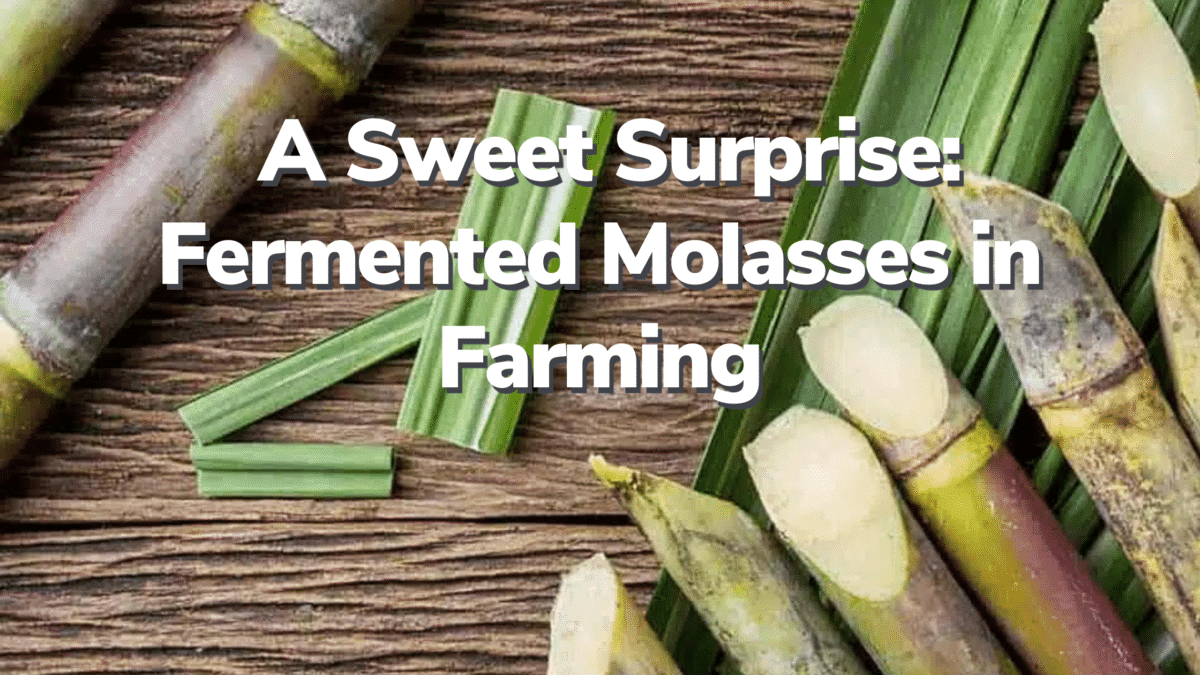It’s responsible for giving brown sugar its flavour and colour; it adds aroma, colour, and wonderful chew to cookie batters and provides thickness to baked beans, marinades and sauces. You may be aware that molasses has many uses in the culinary world, but did you know that fermented molasses has myriad benefits in farming for both crops and soil health?
What is molasses?
Molasses is the natural by-product left over after most of the sugar is extracted from sugar cane or sugar beets in the manufacturing of sugar. It is
- Non-toxic
- Completely natural
- High in carbohydrates
- Packed with minerals and vitamins
What is molasses fermentation?
Molasses fermentation is a biological process that converts sucrose from molasses into cellular energy, ultimately producing ethanol and carbon dioxide. Derived from sugarcane or sugar beet, molasses serves as a rich substrate for ethanol production, containing fermentable sugars, nitrogen, phosphorus, solid sludge, and ash. Fermentation involves the conversion of these sugars into ethanol, which, in turn, becomes a valuable resource for various applications in agriculture.
Fermentation is the key to harnessing the full potential of molasses. By soaking nutrient-rich materials in molasses for 3-4 weeks, beneficial microbes break down organic matter, creating a fermented, nutrient-dense liquid fertiliser rich in nitrogen, phosphorus, or potassium (depending on the material used).
From by-product to a valuable resource
Fermented molasses is more than just a by-product; it’s a valuable resource for numerous use cases in farming. The nutrient-rich sludge filtered out during ethanol production becomes a mineral-rich, high-carbohydrate feedstuff ideal for agricultural use.
In recent years, the demand for molasses in the agricultural sector has surged as a wider set of fertiliser manufacturers and growers place greater emphasis on natural yet effective ingredients for soil amendment. The burgeoning organic farming industry is also creating market demand for healthier, more environmentally-friendly options for fertilising crops.
The role of molasses in soil improvement
Modern farming uses heavy fertilisers and pesticides that can make soil sterile by killing off good microorganisms. Counteracting this with inputs such as molasses for soil improvement is key to boosting the short and long-term health of your farm.
For centuries, molasses has played a crucial role in agriculture as a fertiliser to promote larger and healthier crop yields worldwide. The use of molasses in soil enhances bacterial health, making the soil more receptive to fertilisers and promoting overall plant health. This is particularly vital in combating the sterilising effects of heavy fertiliser and pesticide use, preserving the delicate balance of microorganisms crucial for soil fertility.
You may also be interested in: Biological Pest Control
The many uses of fermented molasses in farming
Organic fertiliser
Molasses serves as a powerhouse of nutrients and trace minerals, fostering organic soil building and providing a natural answer to pest control. As an organic fertilizer, molasses contains essential nutrients like nitrogen, phosphorus, and potassium, promoting beneficial microbial activity and reducing soil compaction. Microbes not only capture nitrogen from the air for plant absorption but also enhance disease resistance by suppressing the growth of pathogens in the soil. They also make plant food more readily available, ensuring efficient nutrient uptake.
Feedstock additive
When added to animal feed, molasses enhances palatability, promotes weight gain, and acts as a natural fly repellent.
Soil enhancer
Introducing molasses to the soil stimulates the growth of soil organisms, leading to improved soil structure, better moisture retention, and reduced soil erosion. As carbohydrates break down in soil, the molasses improves the health of microorganisms in the ground.
Scientific validation of molasses benefits
Scientific studies, such as the one conducted at Maharishi Markandeshwar University, reveal the profound impact of molasses on crop growth. The experiment showcased better plant growth and yields of okra in soil blended with molasses as an organic fertiliser compared to fields without molasses. This substantiates the claim that molasses is not just a tradition but a scientifically backed method for eco-friendly farming and sustainable agriculture.
The environmental impact of molasses
In a world increasingly focused on sustainable practices, molasses emerges as an environmentally conscious choice. Its use reduces the need for synthetic fertilisers, minimising nutrient runoff and leaching, and contributes to better soil and water health. As a natural and renewable resource, molasses aligns with the principles of organic farming, improving soil structure and moisture retention while promoting healthier soils capable of withstanding environmental stressors.
Zylem proudly offers fermented molasses as a raw material, facilitating the transformation of traditional farming into a sustainable and eco-friendly practice.

About the Author: Alex Platt
Alex is Business Development Manager at Zylem. He’s inspired by the potential of regenerative farming and takes a special interest in the technology and products that are moving agriculture in a more sustainable direction.

